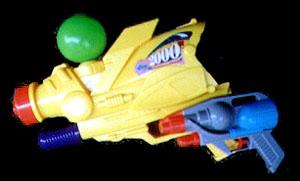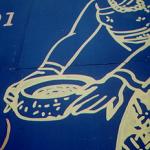Song Kran: Once More Unto the Moat
No Thai holiday inspires such a range and intensity of emotions as does the festival of Song Kran, taking place April 13-15 every year. Marking the Thai new year, it has come to be known as the "water-splashing" or "water-war" festival, because for those three days (and sometimes one before and one after), anyone has the right to drench anyone else with water. April being the hottest and driest month of the year, this drenching is usually welcome; and thousands of people from all over Thailand and the world throng the moat around Chiang Mai to get, and to make each other, as wet as possible - that is, without jumping into the moat itself (which also happens).
Formerly, the water-splashing of Song Kran served different purposes. The first was to afford a chance to pay respect to elders and the Buddha. This was done by pouring rose-scented water over the hands of elders and on Buddha images. Elders in turn placed a daub of starchy paste on the faces of the younger and offered blessings. This ritual, known as rod nahm dum hua, is still practiced: this year, students at my school paid respect to their teachers in this manner; even amidst the chaos of the 'water-war' some semblance of old Song Kran endures.
The water-splashing also used to serve as a plea to nature for plentiful rains, for some respite from the oppressive aridity of April. Oddly enough, now that Song Kran has come to involve such huge amounts of water evaporating into the air, this plea may be more than just an act of faith.
Only in the villages of Thailand do these purposes of Song Kran continue to be widely honored. In the cities, and especially in Chiang Mai where the festival reaches its highest pitch, Song Kran is an all-out war. Like a snowball fight, the war has no clear sides or definite alliances: friends are targets as much as strangers, and some people, driven mad by the intolerable heat, turn hoses and squirt-guns on themselves.
Like any war, Song Kran inspires cheers of victory and groans of defeat, and the more elusive or defenseless a target, the more satisfying the direct hit. A sort of battlefield paranoia sets in. No one is trusted; no one is safe (except monks - even policemen are fair game, their walkie-talkies wrapped in plastic). Anyone conspicuously dry is soon encircled by a gleeful infantry and made dry no more.
Part of the evolution of Song Kran has been technological. Hand-held tureens and buckets gave way to water-pistols, which in turn gave way to "super-soakers". A few years ago, a farang is reputed to have invented what the Thais now call a "cylinder spray water", a roughly meter-long PVC pipe fitted with a plunger. It can project water across a street and can knock your hat off. Now these unadorned, inexpensive weapons are standard issue, and two-pronged trombone-slide-like variations are growing in popularity. As one farang effused, "You can put a liter of water right into someone's ear!" Another farang used an umbrella as a shield to great effect, jokingly calling it "SDI" - the "Star Wars" missile-defense system.
The Song Kran armies have also become increasingly motorized. They ride in the backs of pick-up trucks, in tsong-taos, in tuk-tuks without roofs. This makes them more mobile, but also more vulnerable: there is no joy like running up behind a tsong-tao and soaking its trapped passengers, unless it is to pummel the riders in a roofless tuk-tuk stuck in traffic. Even a motorcycle will suffice: just put a pail of water in the cycle's front basket for quick re-loading. If the water runs out, hordes of people standing by the moat will cast a tethered pail into the murky water and drag it up for your use.
Another advance in the Song Kran arms race is the use of ice water. Warriors in possession of a barrel or trashcan buy huge blocks of ice from ubiquitous vendors to chill their reservoirs nearly to the freezing point. While it takes only a few seconds to recover from such an arctic blast, the initial shock is enough to inspire thoughts of revenge.
Many people believe that these changes and others have spoiled the traditional spirit of Song Kran. To be sure, the festival has its excesses. Many revelers len nahm ("play water") well after the sun is down, when the cold water is no longer refreshing and one has already changed into dry clothes. Every year somebody gets a damaging jet of water in the eye, or is knocked off a motorbike. Many get sick from involuntarily swallowing too much of the sewage-tainted klong water. This year over 700 people died in festival-related driving accidents, most caused by intoxication. And the old city of Chiang Mai becomes one huge, intractable traffic jam. What was once a gentle, respectful festival, detractors argue, has become a hedonistic, at times tragic free-for-all.
I beg to differ. Anything fun has elements of danger and discord. The growing tendency to abandon the fun because of a few bad seeds or bad deeds promises a very dull world indeed. Further, it must be remembered that the ammunition of Song Kran is water. While in other parts of the world fanatics busy themselves about the dropping of bombs, the shooting of bullets, and the chucking of rocks, in Thailand they exchange cool benedictions.
Furthermore, despite the changes, Song Kran continues to draw people of all ages and kinds. You are just as likely to get soaked by a wizened, grinning octogenarian as by an eight-year-old; by a seemingly meek Thai university student as by a growling farang rastafarian. Where else can you see graying American retirees bearing neon reserve water tanks on their backs, wading through flooded streets, euphorically to wreak fluid revenge on some squirt-gun-wielding schoolchild?
Song Kran is a peaceful exercise of the indubitable human instinct for war. It makes actual a desire for rain and for a release from the tyranny of the sun. Between strangers acknowledging a dousing well done, it inspires smiles, thumbs-ups, and greetings of sawatdee pee mai ("happy new year"). For three days, it totally precludes taking yourself too seriously: your ironed clothes, your perfect coiffure, your important documents, your pressing appointments. All are at the mercy of the deluge. All return to the watery state whence they came.
* * * * *
 ThingsAsian
ThingsAsian


















